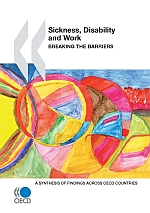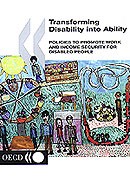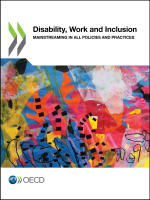Employment
Sickness and Disability
|
Twenty years ago, the OECD launched its comparative work on disability policies contributing to the development of a new policy paradigm that emphasised the need for a stronger focus of disability policy on employment. This work has contributed to a change in policy thinking and a range of policy responses in OECD countries. However, real change on the ground has been lagging behind as exemplified by the stubbornly low employment rates of persons with disability. This suggests that the necessary policy transformation is incomplete and that the resources invested in creating equal opportunities for persons with disability are insufficient. Meanwhile the world is changing rapidly and this change is affecting persons with disability at least as much as other groups of the population. Digitalisation, globalisation, population ageing and climate change have a profound impact on future labour markets, introducing new challenges and creating new opportunities for persons with disability. New work will address two urgent questions: the likely impact of the ongoing global transformations around the future of work on persons with disability and the reasons for the slow progress in labour market inclusion of persons with disability in the past 10-20 years. Closing the disability employment gap through better sickness and disability policy will be critical for tackling inequality and ensuring inclusive growth. |
NEW REPORTS
- Report: Disability, Work and Inclusion in Italy: Better Assessment for Better Surpport (Italiano) (November 2023)
Project Output: Improving the disability assessment and social protection system in Italy
- Report: Disability, work and inclusion in Korea: Towards equitable and adequate social protection for sick workers (May 2023)
- Report: Disability, work and inclusion: Mainstreaming in all policies and practices (October 2022)
- Report: Disability, work and inclusion in Slovenia: Towards early intervention for sick workers (March 2022)
- Report: Disability, work and inclusion in Ireland: Engaging and supporting employers (September 2021)
POLICY BRIEFS AND WORKING PAPERS
- New! Using AI to support people with disability in the labour market (December 2023)
- Can disability benefits promote (re)employment? (December 2020)
- Paid sick leave to protect income, health and jobs through the COVID-19 crisis (July 2020)
KEY PUBLICATIONS
|
|
 |
 |
| The publication Disability, Work and Inclusion (2022) concludes that the disability policy transformation initiated 10-15 years ago is incomplete and too slow, and that countries must expand disability mainstreaming in all policies and practices – in education policy, labour market policy and social policy – to facilitate earlier support and ensure more sustainable and equal inclusion of people with disability. | Why is it that population health is improving, yet more and more people of working age end up out of the workforce relying on long-term sickness and disability benefits?
The publication Sickness, Disability and Work: Breaking the Barriers (2010) synthesises the findings of a series of country reviews that explore this paradox in more detail. |
The publication Transforming Disability into Ability (2003) postulates a new disability policy paradigm that emphasises employment on a par with social protection, with a new focus on activation, tailored early intervention, work incentives and obligations for employers, workers and public authorities. |
COUNTRY STUDIES UNTIL 2010
The series of country reports looks specifically at the country and highlights the role of institutions and policies. A range of reform recommendations is put forward. Publications between 2006 and 2010.
- Canada
- Sweden
- Denmark, Finland, Ireland, the Netherlands
- Australia, Luxembourg, Spain, United Kingdom
- Norway, Poland and Switzerland
CONTACT US
Please contact us at: els.contact@oecd.org
 Follow us on Twitter @OECD_Social
Follow us on Twitter @OECD_Social
Related Documents
